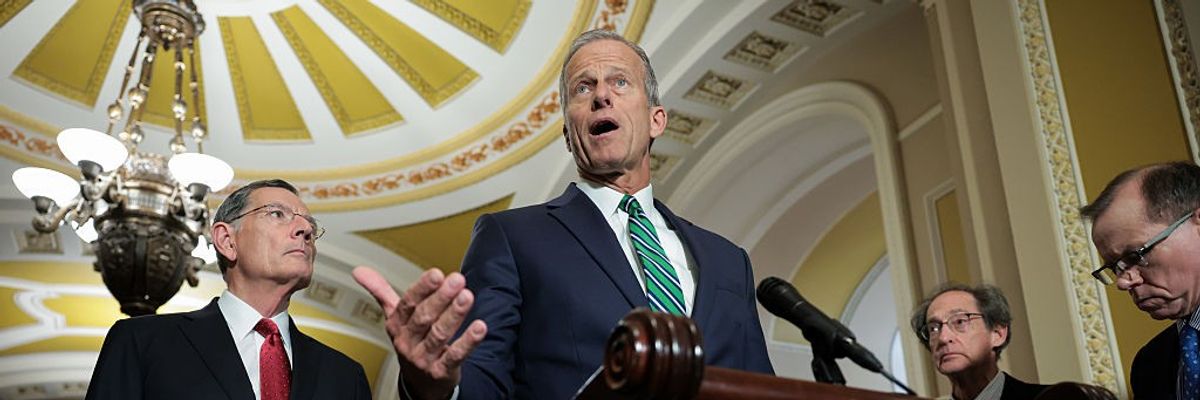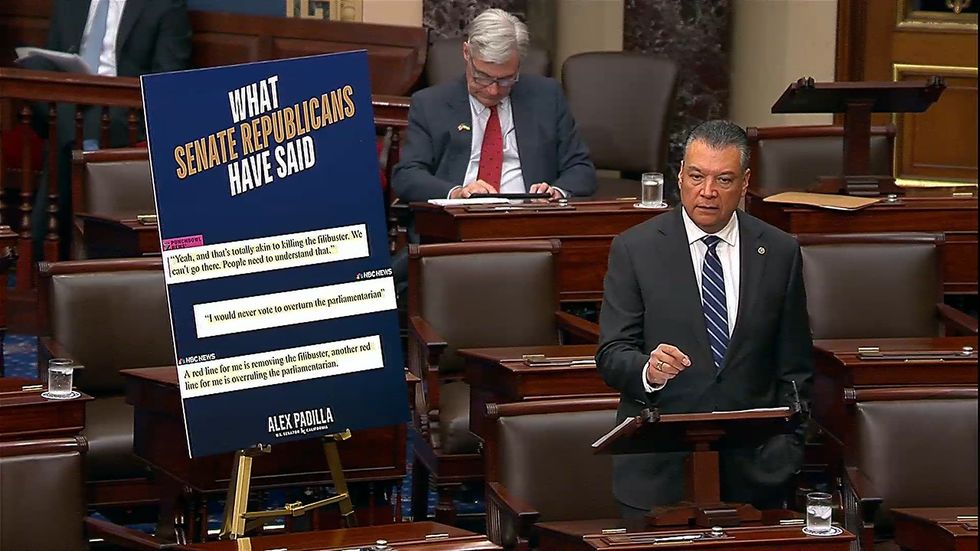

SUBSCRIBE TO OUR FREE NEWSLETTER
Daily news & progressive opinion—funded by the people, not the corporations—delivered straight to your inbox.
5
#000000
#FFFFFF
To donate by check, phone, or other method, see our More Ways to Give page.


Daily news & progressive opinion—funded by the people, not the corporations—delivered straight to your inbox.

U.S. Senate Majority Leader John Thune (R-S.D.) speaks to reporters on May 06, 2025 in Washington, D.C.
With Trump in office and the wholesale dismantling of democracy underway, one watchdog called what Republicans are planning "the last thing the country needs right now."
But critics warned that the implications of the Republican plan, which the party's leadership is still discussing, are far-reaching and could enable the GOP to advance other unpopular elements of their pro-corporate, far-right agenda.
"If senators are willing to overrule the Senate parliamentarian and circumvent Senate rules on the filibuster for the Congressional Review Act, there is nothing to stop them from going nuclear over and over with policies that would harm Americans and destabilize our democracy," said Lisa Gilbert, co-president of the consumer advocacy group Public Citizen, on Thursday. "This could happen with other CRA proposals or in the reconciliation process."
The CRA allows lawmakers to review and—with the support of a simple majority in both chambers of Congress—overturn federal rules within a limited timeframe. CRA resolutions of disapproval are not subject to the Senate's 60-vote filibuster, a relic of the Jim Crow era that Republicans have selectively defended or scrapped depending on whether they're in the majority.
Republicans want to use the filibuster-proof CRA to block California's Clean Air Act waivers, but the Senate parliamentarian—the chamber's unelected arbiter of Senate rules and procedures—has said the waivers don't qualify as rules subject to the CRA.
Defying the parliamentarian—something Republicans have already done as they craft their bill to slash safety net programs and taxes for the rich—to undo the waivers would effectively gut the filibuster, opponents of the GOP plan warned. Earlier this month, the Republican-controlled House voted to revoke the California waivers using the CRA.
"Anti-democratic and authoritarian measures, corporate giveaways, and rights infringements that could never become law if normal Senate rules were followed—legislation making it harder to vote, repealing core environmental standards, stripping abortion rights, and more—might suddenly become law," Gilbert warned Thursday. "A backdoor nuclear option sets an atrocious precedent and must not be allowed. Critical checks hang in the balance."
"Think about how the Trump administration might abuse this."
Sen. Sheldon Whitehouse (D-R.I.), the top Democrat on the Senate Environment and Public Works Committee, echoed those concerns, saying in a floor speech Thursday that "the import of overruling the parliamentarian extends far beyond CRA resolutions."
"Think about how the Trump administration might abuse this," said Whitehouse. "Everyone knows by now that President Trump has a beef with a whole host of media outlets, some of which are licensed by the Federal Communications Commission. What's to stop the FCC from submitting CBS' license as a 'rule' and members from introducing a disapproval resolution? Is this really the path we want to go down?"
In a floor speech of his own, Sen. Alex Padilla (D-Calif.) directly quoted Senate Majority Leader John Thune's (R-S.D.) warning earlier this year against overruling the parliamentarian.
"That's totally akin to killing the filibuster. We can't go there," Thune said in January. "People need to understand that."

Earlier this week, Thune said his caucus is "still looking at" voting on a CRA resolution to revoke the California waivers. Senate Majority Whip John Barrasso (R-Wyo.) told Axios last week that the upper chamber would "absolutely" take up the House-passed CRA resolution.
Gilbert of Public Citizen said Thursday that "this backdoor nuclear option would not only make the Senate more like the House—it would make the Senate more like the chaotic, make-it-up-as-you-go White House."
"That's the last thing the country needs right now," she added.
Dear Common Dreams reader, The U.S. is on a fast track to authoritarianism like nothing I've ever seen. Meanwhile, corporate news outlets are utterly capitulating to Trump, twisting their coverage to avoid drawing his ire while lining up to stuff cash in his pockets. That's why I believe that Common Dreams is doing the best and most consequential reporting that we've ever done. Our small but mighty team is a progressive reporting powerhouse, covering the news every day that the corporate media never will. Our mission has always been simple: To inform. To inspire. And to ignite change for the common good. Now here's the key piece that I want all our readers to understand: None of this would be possible without your financial support. That's not just some fundraising cliche. It's the absolute and literal truth. We don't accept corporate advertising and never will. We don't have a paywall because we don't think people should be blocked from critical news based on their ability to pay. Everything we do is funded by the donations of readers like you. Will you donate now to help power the nonprofit, independent reporting of Common Dreams? Thank you for being a vital member of our community. Together, we can keep independent journalism alive when it’s needed most. - Craig Brown, Co-founder |
But critics warned that the implications of the Republican plan, which the party's leadership is still discussing, are far-reaching and could enable the GOP to advance other unpopular elements of their pro-corporate, far-right agenda.
"If senators are willing to overrule the Senate parliamentarian and circumvent Senate rules on the filibuster for the Congressional Review Act, there is nothing to stop them from going nuclear over and over with policies that would harm Americans and destabilize our democracy," said Lisa Gilbert, co-president of the consumer advocacy group Public Citizen, on Thursday. "This could happen with other CRA proposals or in the reconciliation process."
The CRA allows lawmakers to review and—with the support of a simple majority in both chambers of Congress—overturn federal rules within a limited timeframe. CRA resolutions of disapproval are not subject to the Senate's 60-vote filibuster, a relic of the Jim Crow era that Republicans have selectively defended or scrapped depending on whether they're in the majority.
Republicans want to use the filibuster-proof CRA to block California's Clean Air Act waivers, but the Senate parliamentarian—the chamber's unelected arbiter of Senate rules and procedures—has said the waivers don't qualify as rules subject to the CRA.
Defying the parliamentarian—something Republicans have already done as they craft their bill to slash safety net programs and taxes for the rich—to undo the waivers would effectively gut the filibuster, opponents of the GOP plan warned. Earlier this month, the Republican-controlled House voted to revoke the California waivers using the CRA.
"Anti-democratic and authoritarian measures, corporate giveaways, and rights infringements that could never become law if normal Senate rules were followed—legislation making it harder to vote, repealing core environmental standards, stripping abortion rights, and more—might suddenly become law," Gilbert warned Thursday. "A backdoor nuclear option sets an atrocious precedent and must not be allowed. Critical checks hang in the balance."
"Think about how the Trump administration might abuse this."
Sen. Sheldon Whitehouse (D-R.I.), the top Democrat on the Senate Environment and Public Works Committee, echoed those concerns, saying in a floor speech Thursday that "the import of overruling the parliamentarian extends far beyond CRA resolutions."
"Think about how the Trump administration might abuse this," said Whitehouse. "Everyone knows by now that President Trump has a beef with a whole host of media outlets, some of which are licensed by the Federal Communications Commission. What's to stop the FCC from submitting CBS' license as a 'rule' and members from introducing a disapproval resolution? Is this really the path we want to go down?"
In a floor speech of his own, Sen. Alex Padilla (D-Calif.) directly quoted Senate Majority Leader John Thune's (R-S.D.) warning earlier this year against overruling the parliamentarian.
"That's totally akin to killing the filibuster. We can't go there," Thune said in January. "People need to understand that."

Earlier this week, Thune said his caucus is "still looking at" voting on a CRA resolution to revoke the California waivers. Senate Majority Whip John Barrasso (R-Wyo.) told Axios last week that the upper chamber would "absolutely" take up the House-passed CRA resolution.
Gilbert of Public Citizen said Thursday that "this backdoor nuclear option would not only make the Senate more like the House—it would make the Senate more like the chaotic, make-it-up-as-you-go White House."
"That's the last thing the country needs right now," she added.
But critics warned that the implications of the Republican plan, which the party's leadership is still discussing, are far-reaching and could enable the GOP to advance other unpopular elements of their pro-corporate, far-right agenda.
"If senators are willing to overrule the Senate parliamentarian and circumvent Senate rules on the filibuster for the Congressional Review Act, there is nothing to stop them from going nuclear over and over with policies that would harm Americans and destabilize our democracy," said Lisa Gilbert, co-president of the consumer advocacy group Public Citizen, on Thursday. "This could happen with other CRA proposals or in the reconciliation process."
The CRA allows lawmakers to review and—with the support of a simple majority in both chambers of Congress—overturn federal rules within a limited timeframe. CRA resolutions of disapproval are not subject to the Senate's 60-vote filibuster, a relic of the Jim Crow era that Republicans have selectively defended or scrapped depending on whether they're in the majority.
Republicans want to use the filibuster-proof CRA to block California's Clean Air Act waivers, but the Senate parliamentarian—the chamber's unelected arbiter of Senate rules and procedures—has said the waivers don't qualify as rules subject to the CRA.
Defying the parliamentarian—something Republicans have already done as they craft their bill to slash safety net programs and taxes for the rich—to undo the waivers would effectively gut the filibuster, opponents of the GOP plan warned. Earlier this month, the Republican-controlled House voted to revoke the California waivers using the CRA.
"Anti-democratic and authoritarian measures, corporate giveaways, and rights infringements that could never become law if normal Senate rules were followed—legislation making it harder to vote, repealing core environmental standards, stripping abortion rights, and more—might suddenly become law," Gilbert warned Thursday. "A backdoor nuclear option sets an atrocious precedent and must not be allowed. Critical checks hang in the balance."
"Think about how the Trump administration might abuse this."
Sen. Sheldon Whitehouse (D-R.I.), the top Democrat on the Senate Environment and Public Works Committee, echoed those concerns, saying in a floor speech Thursday that "the import of overruling the parliamentarian extends far beyond CRA resolutions."
"Think about how the Trump administration might abuse this," said Whitehouse. "Everyone knows by now that President Trump has a beef with a whole host of media outlets, some of which are licensed by the Federal Communications Commission. What's to stop the FCC from submitting CBS' license as a 'rule' and members from introducing a disapproval resolution? Is this really the path we want to go down?"
In a floor speech of his own, Sen. Alex Padilla (D-Calif.) directly quoted Senate Majority Leader John Thune's (R-S.D.) warning earlier this year against overruling the parliamentarian.
"That's totally akin to killing the filibuster. We can't go there," Thune said in January. "People need to understand that."

Earlier this week, Thune said his caucus is "still looking at" voting on a CRA resolution to revoke the California waivers. Senate Majority Whip John Barrasso (R-Wyo.) told Axios last week that the upper chamber would "absolutely" take up the House-passed CRA resolution.
Gilbert of Public Citizen said Thursday that "this backdoor nuclear option would not only make the Senate more like the House—it would make the Senate more like the chaotic, make-it-up-as-you-go White House."
"That's the last thing the country needs right now," she added.